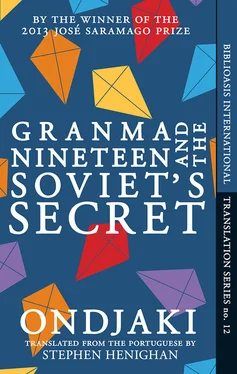I crumpled the letter, tore it into little pieces and dropped it in the toilet to flush away Comrade Gudafterov’s words.
“Go write letters to your own darn wife there in the far-away.” I grabbed the water bucket and poured the whole thing into the toilet so that no paper remained.
“What’s the hold-up? Come to the table,” Granma called.
“Sorry, Granma, I was washing my face. It’s really hot.”
“Come and sit down. And I don’t want to see any elbows on the table.”
During lunch I saw the Boss General’s jeep pass by the window really fast, with the soldiers aiming their AK-47s at the sky. It made me nervous, and I wondered if they’d found the dynamite buried at the cardinal points 3.14 invented. Some day I’m going to ask André the commando if they also have that code of cardinal points in war zones, because I figured it was an awesome idea of Pi’s — unless he had seen it in a movie and not told me about it.
“Granma, can I go play?”
“Right after eating, with this sun on your head? Perish the thought. We’re going to take a siesta.”
It was better not to argue. Insisting too much might put Granma in a bad mood, and then she might send me to lie down for the whole afternoon. I needed not to get angry at her in order to be free later in the afternoon, or even at night, whatever turned out to be the time to grab the “hod drink.”
“Can I go to Granma Catarina’s room?”
“No. You’re going to lie down in my bed.”
“All right, Granma.”
“If you fall asleep, I’ll wake you later. Today Doctor Rafael is coming here. You can help me understand what he says.”
“Late in the afternoon, Granma?”
“I think so, I’m not sure.”
“But I’ve already agreed to go play with 3.14 then.”
“You can play later. I’ll let you go out afterwards.”
Granma must have been tired, or sleepy from the pills she was taking for the pain: she soon fell asleep next to me. I heard a few whistles from downstairs but I was unable to open the window, because it might have woken Granma up.
I rolled over very gently and entered Granma Catarina’s room. She was rocking in her chair.
“Granma, just let me open the window a moment.”
“Open it, son. It’s all the same to me.”
Down below, 3.14, drenched in sweat by the midday sun — I don’t even want to imagine the smell of his b.o.-dorov— was calling out to me to come downstairs. In his hand he had a letter identical to the one I had drowned in the bathroom. Annoyed, I went downstairs.
“Where are you going? Aren’t you supposed to be sleeping? I’m going to tell on you,” Madalena said, and started up the stairs.
“Listen carefully, Madalena: if you tell Granma that I went out, I swear I’m going to tell her about all the times I saw you smooching with a Soviet soldier, and also with another Angolan soldier, and I’m also going to tell about the time on Saturday night when I saw you come in at close to two in the morning, when even the clock in the living room was striking the hour, and you were wearing that miniskirt that Granma already forbid you to wear because it’s so short, and I’m going to tell her about the baths you take in the white foam of the sea with that boy, even when the water is cold or full of jellyfish. Do you hear me?”
Madalena’s face was so fearful that it looked as if she was going to faint. She stood still, looking at me, and only later said: “I’m sorry. You can go. I was just joking.”
3.14 was waiting for me, half-concealed, amidst the trees.
“Listen to this: it looks like Gudafterov mined the beach with letters for your granma.” He laughed.
“I don’t find that funny at all.”
“What did the other letter say?”
“I don’t know. It was unreadable. I threw it away.”
“It was your Aunt Adelaide who gave me this one. She said that Gudafterov left it with her to hand in to your granma.”
“Son of a bitch.”
“If you want, I can try to read it.”
“Open it quickly. I escaped from bed. My granma’s sleeping.”
We tore open the envelope and the letter resembled the other one, but the handwriting was more difficult and it was impossible to understand anything. It started with Deer Komrad Frend Dona Nhéte , and after that you could hardly make out anything.
“Look at this. He wrote the word ‘explosion.’”
“Are you sure?”
“Don’t you see it then? It’s written ‘explozhun,’ which must be ‘explosion’ in Russian.”
“But my granma doesn’t understand Russian.”
“You ain’t gettin’ it; it must be a tattletale letter. He must be telling on us about the dynamite.”
“Son of a bitch.”
“If you want, we’ll burn the letter right now. I brought matches.”
“Sure. You burn it. I’m going back to the room.”
“What? And are you coming back?”
“I can only do it late in the afternoon. We’re waiting for Rafael KnockKnock’s visit.”
“Okay.”
Granma Nineteen was sleeping when I returned to the room, and it must have been a deep sleep because she was snoring rather loudly.
I didn’t find Granma Catarina in the room, nor was she in the bathroom, and Madalena Kamussekele hadn’t seen her either. An almost oppressive sadness swamped my chest, and that’s not just blather; it was right in the chest that I got a strange feeling. I went to bed but was unable to fall asleep.
I got up again and went to Granma Catarina’s room. Everything was tidied up, the black shawl folded on the bed next to the pillow, on the bedside table were photos of all of the grandchildren and a thread, black also, was attached to a freshly polished silver crucifix. The mirror, too, was cleaner than on other days, and the window was closed and locked. There was no smell of any sort to indicate that someone had been there a short time before. It seemed like a lie, or a disappearance in the movies.
“Granma Catarina?” The words issued from my lips very gently, but there was no reply.
Never again was there a reply. Never again did Granma Catarina appear. She didn’t say goodbye to me, nor did she warn me that she couldn’t speak with me any longer, not even in secret without my telling anyone. It must be because Granma Catarina really didn’t like farewells. She always used to say: “You see, in the old days people were people who arrived. We didn’t know how to take our farewell.”
I sat down on the bed. I don’t like farewells at all, either, Granma Catarina, I thought, and in the big mirror, I saw myself seated there. I started to dredge up memories of moments or conversations with Granma Catarina in order to see whether at some point she would come into the room — but there was nothing.
“Do you know things about the future, Granma Catarina?” I asked her one day when she sat down next to me at the breakfast table.
“The future is full of difficult things that happen in a different way each time. I prefer to divine the past.”
She didn’t like to speak to a lot of people in those last years and not even Granma Nineteen liked it very much when the children said they had been with Granma Catarina at either breakfast time, or at any other.
“But why? Granma Catarina always talks with us. Why can’t we tell anyone about it? Why?”
“Because you can’t.”
It was a response children heard often. “You can’t go play because”; or, if it was a little later, and darker out, “because I say so.” Going to the beach when the sea was rough, skipping class when you didn’t feel like going to school in the morning, didn’t want to get a vaccination, didn’t want to go to the dentist, playing in the dusty square when the water truck was damping down the earth, standing beneath the rain with mouth and arms open when it rained hard, wearing red blouses if it was thundering, having fun with crazy Sea Foam, asking Dona Libânia why she wasn’t married, asking Senhor Tuarles why his other daughters didn’t wear glasses so that they could see the soap operas properly, eating green mangoes with salt, staying in bed until noon, it was all not allowed “because you can’t.” But there must be a reason for these things and the elders could at least do us the favour of telling us instead of keeping this secret to themselves.
Читать дальше












